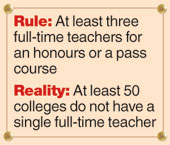 |
Around 100 colleges in the city are functioning without the required number of teachers.
University rules stipulate at least three full-time teachers for every honours or pass course. “But there are at least 100 colleges in the city where several departments make do with a single full-time teacher each. At least 50 institutions do not even have a single full-time teacher,” said a CU official.
A source in CU said geography, psychology, history, zoology and mathematics were among the most affected subjects. But students alleged the situation was worse in courses in emerging areas, such as microbiology, electronic science, computer science, journalism, communicative English and business administration.
The heads of some colleges attributed the problem to the Sixth Pay Commission’s recommendation of a cent percent hike in the salary of a full-time contractual teacher, who now gets Rs 8,000 a month.
According to norms, the government pays the salaries of full-time teachers appointed to sanctioned posts while colleges themselves foot the bill for full-time contractual teachers.
Colleges that do not have enough sanctioned posts of full-time teachers or where such posts are lying vacant have the liberty to make up for the shortfall by hiring full-time contractual teachers.
But many colleges fear appointing contractual whole-time teachers at this juncture would land them in a financial mess.
“We have limited funds and it would be difficult for us to spend Rs 16,000 on a whole-time contractual teacher,” said Manjusha Tarafdar, the principal of Muralidhar Girls’ College.
A section of principals is blaming the shortage of teachers on the government’s failure to create enough teaching posts.
“Given our student strength, we need more government-sanctioned posts. A proposal for increasing the number of teaching posts has been sent to the government,” said Asutosh College principal Dipak Kar.
Another reason for the crisis, points out a third group of college heads, is the government “embargo on appointing part-time teachers”.
The government provides the salaries of part-time teachers appointed against a sanctioned post lying vacant. A part-time lecturer gets a salary of Rs 7,000 to Rs 10,000 a month.
“A government directive states we can appoint two part-time teachers against one vacant sanctioned post of a full-time teacher. The funds are stopped as soon as the sanctioned post is filled up. The government should change its policy and pay the salaries of all part-time teachers,” said the head of a city college.
An official in the higher education department, however, denied most colleges were facing a funds crisis and could not bear the salaries of part-time lecturers.
“Colleges should have enough money to pay the salaries of part-time teachers as the government has stopped taking its share of tuition fees from them,” the official said.
CU vice-chancellor Suranjan Das said the university had no role to play in the matter as it could not meddle in the financial matters of the affiliates.
--------------------------------------------------------------------------------











